Key takeaways:
- Privacy advocacy is crucial for protecting individual rights and fostering community trust amidst growing digital surveillance.
- Real-life stories and personal experiences are key in connecting with others and motivating action in the fight for privacy.
- Building a supportive community and engaging in meaningful conversations can enhance advocacy efforts and empower individuals.
- Finding ways to articulate messages and share experiences through social media and public speaking can amplify one’s voice in privacy advocacy.

Understanding privacy advocacy
Privacy advocacy is all about safeguarding individual rights in an increasingly digital world. I remember the first time I realized just how invasive technology can be; it struck me when I saw a targeted ad pop up for something I had only casually mentioned to a friend. It made me question not just how my data was used, but who truly controls it and to what end.
Embracing privacy advocacy means acknowledging the vulnerabilities we face and understanding the complexities of data privacy laws. I often find myself pondering, how many of us are truly aware of the terms we agree to without reading? That moment of realization can be a game-changer, sparking deeper conversations about consent and control over personal information.
Furthermore, engaging in privacy advocacy involves empowering others through education and awareness. The first time I organized a workshop on data privacy, I felt a surge of hope as participants left with newfound knowledge. I truly believe that informed individuals are our best allies in the fight for privacy, as they can advocate for themselves and others in a digital landscape that often seems overwhelming.
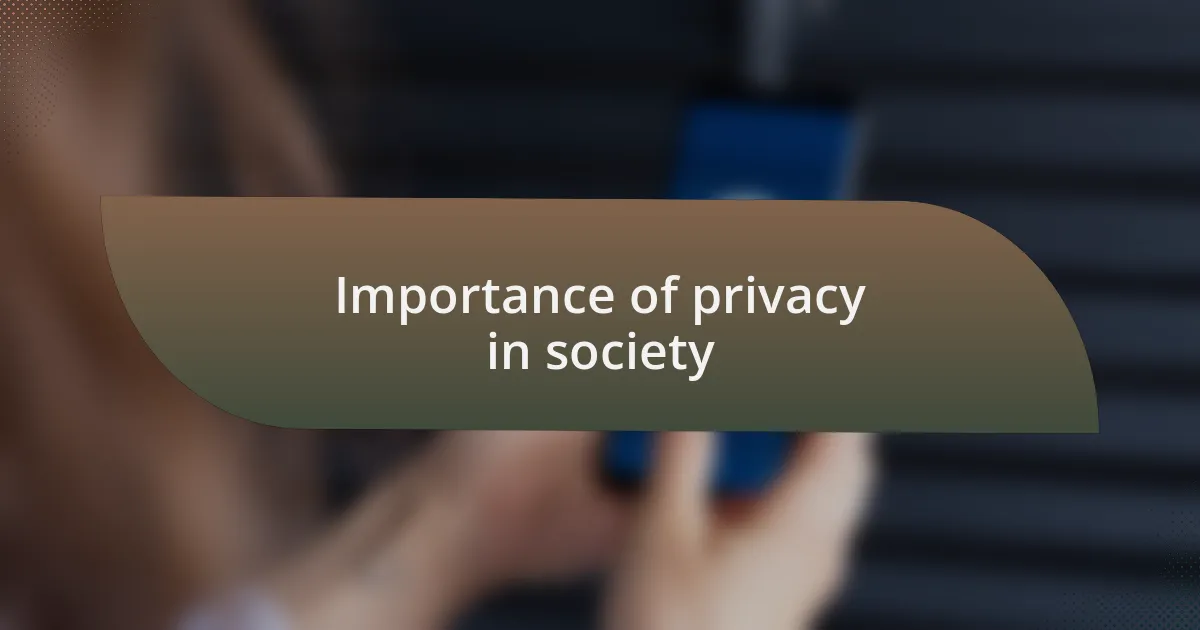
Importance of privacy in society
Privacy isn’t just a personal concern; it’s a vital part of our societal fabric. It struck me hard during a community meeting when someone shared their story about how a data breach impacted their life. Hearing their fear and confusion made me realize that when privacy is compromised, it doesn’t just affect individuals—it erodes trust within communities.
I often find myself thinking about the power dynamics at play in our everyday lives. For instance, when I walk through a city and see surveillance cameras everywhere, I feel a sense of unease. Who is watching? What data is being collected? This constant surveillance can make us feel like we’re living in a society that prioritizes control over freedom, and that is a troubling thought.
In discussions about privacy, it becomes clear how intertwined it is with freedom of expression and democratic participation. When we’re uncertain about who has access to our words or actions, does it not make us hesitate to fully express ourselves? I vividly recall a moment when I hesitated to post my opinion on social media, knowing the implications of being “watched.” It’s moments like these that highlight the critical need to protect privacy—not just for ourselves, but for a healthy society as a whole.
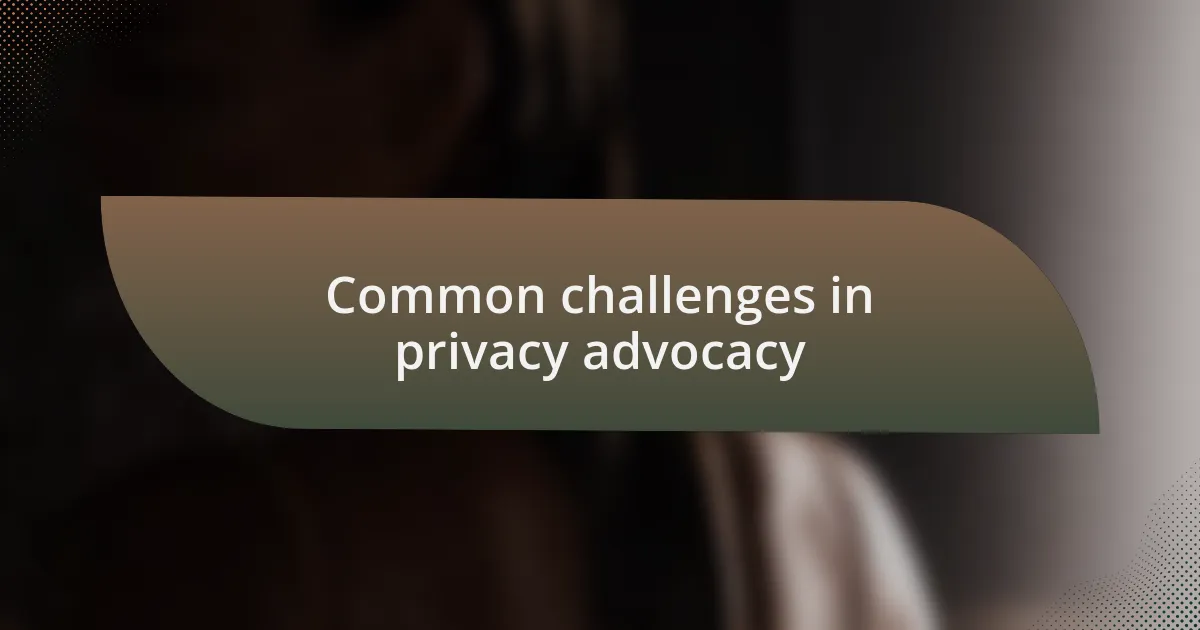
Common challenges in privacy advocacy
Engaging in privacy advocacy often presents the challenge of combating misinformation and misconceptions. I’ve encountered countless individuals who equate privacy concerns with having something to hide. It’s a frustrating notion because it overlooks the fundamental right to privacy that everyone deserves. How do I convince someone that valuing privacy is about protection, not guilt?
Another obstacle is the technical jargon that permeates discussions around privacy. During a workshop, I noticed people zoning out when terms like “data encryption” and “DPI” (deep packet inspection) came up. It struck me how necessary it is to demystify these concepts so that everyone feels empowered to join the conversation. If I can’t break it down into digestible pieces, how can I expect others to engage?
Finally, I’ve faced the daunting reality of institutional pushback. When advocating for stronger privacy laws, I’ve often felt like David facing Goliath. Many organizations prioritize profit over privacy, making the battle seem overwhelmingly skewed. How do I keep my passion ignited in the face of such significant opposition? It’s the stories of individuals whose lives have been impacted that inspire me to keep pushing forward.
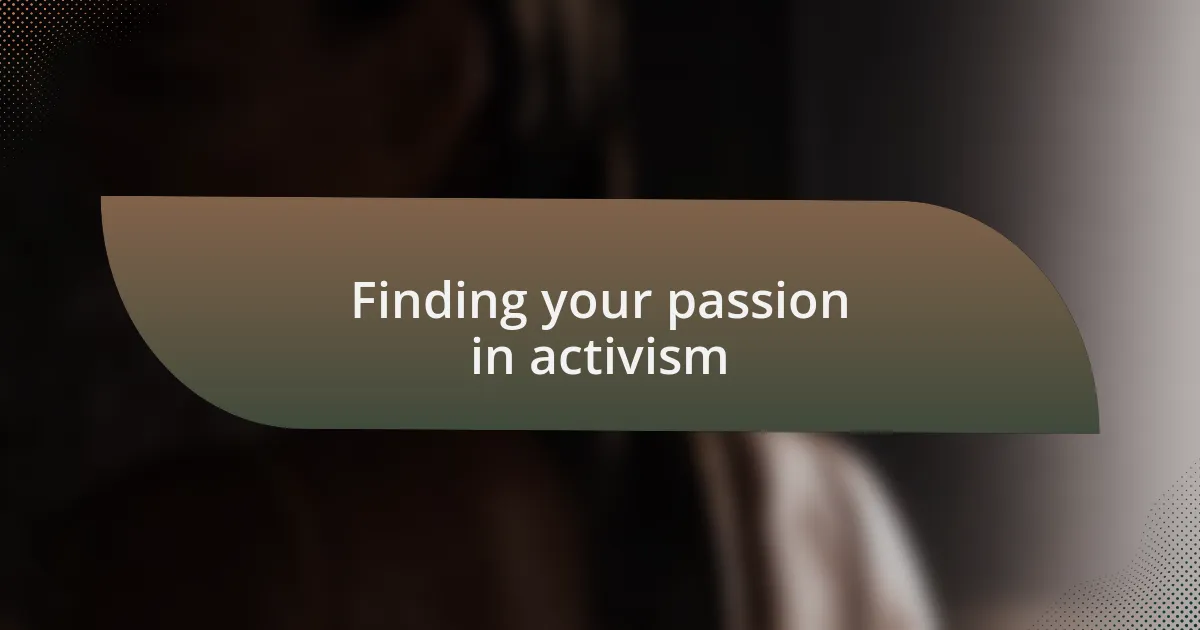
Finding your passion in activism
Activism often begins with a spark—something that resonates deeply within you. For me, it was the realization that my own privacy had been compromised without my knowledge. I remember a moment when I received a notification about my data being used in ways I never consented to. This violation felt personal, and it ignited a fire within me to stand up for not just my rights, but those of others as well. Have you ever had a similar revelation that motivated you to take action?
As I explored my passion for privacy advocacy, I noticed that the most profound moments came when I connected my cause to my personal experiences. I discovered that sharing my journey appealed to others who felt similarly vulnerable. One day, while speaking at a community event, I shared a story about a friend who lost their job due to a data breach. The audience’s response was palpable; they understood the human element behind the statistics. It dawned on me that activism thrives on these real-life connections—have you found your “story” yet?
Finding your passion is also about trial and error. I experimented with various approaches, from social media campaigns to grassroots organizing. There were times when I felt discouraged—like my efforts were falling flat. But each small victory, whether it was a conversation that sparked interest or a policy change, fueled my commitment. I learned that passion isn’t just about one big revelation; it’s a series of moments that, when combined, create a powerful push toward change. How do your experiences shape your activism journey?
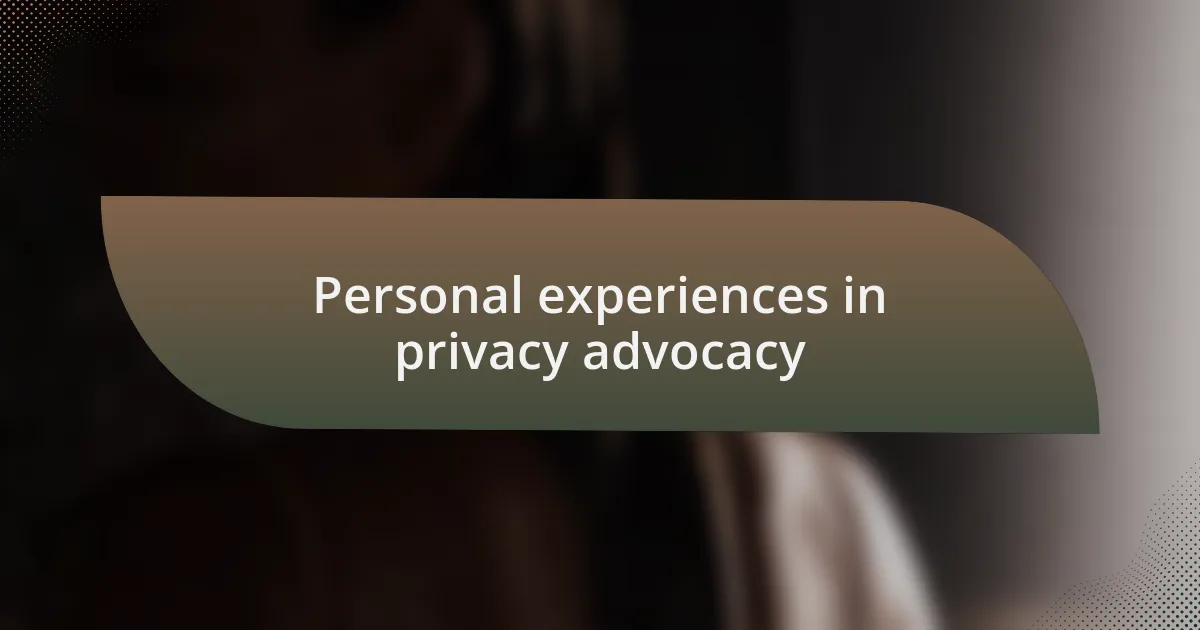
Personal experiences in privacy advocacy
As I began delving deeper into privacy advocacy, I quickly realized the power of community. I attended my first privacy-focused workshop, expecting to be overwhelmed by technical jargon, but instead, I was struck by the stories shared by fellow advocates. There was one participant who spoke about how an unguarded moment online had led to a barrage of unwanted attention. Listening to this human experience reminded me that behind every statistic, there’s a story that deserves to be heard.
One particular incident stands out in my memory. During a panel discussion, I had the opportunity to engage with a skilled data scientist who discussed her work on privacy tools. As she spoke, I could feel the collective anxiety in the room. I had a burning question: “How do we ensure these tools are accessible to everyone, not just the tech-savvy?” Her answer opened up a dialogue that resonated with so many attending. It was a pivotal moment for me, showing how dialogue could elevate collective understanding—how do you foster such conversations in your own advocacy?
My journey has also been shaped by the challenges of navigating a complex landscape filled with misinformation. I recall a heated debate on social media where I passionately defended the importance of data privacy rights. It was disheartening to see backlash, but I took it as an opportunity. Instead of retreating, I reached out to those who disagreed and asked about their concerns. This approach sparked meaningful dialogue and reminded me that advocacy isn’t just about shouting louder—it’s about listening, engaging, and building bridges. How do you approach conversations with differing viewpoints?
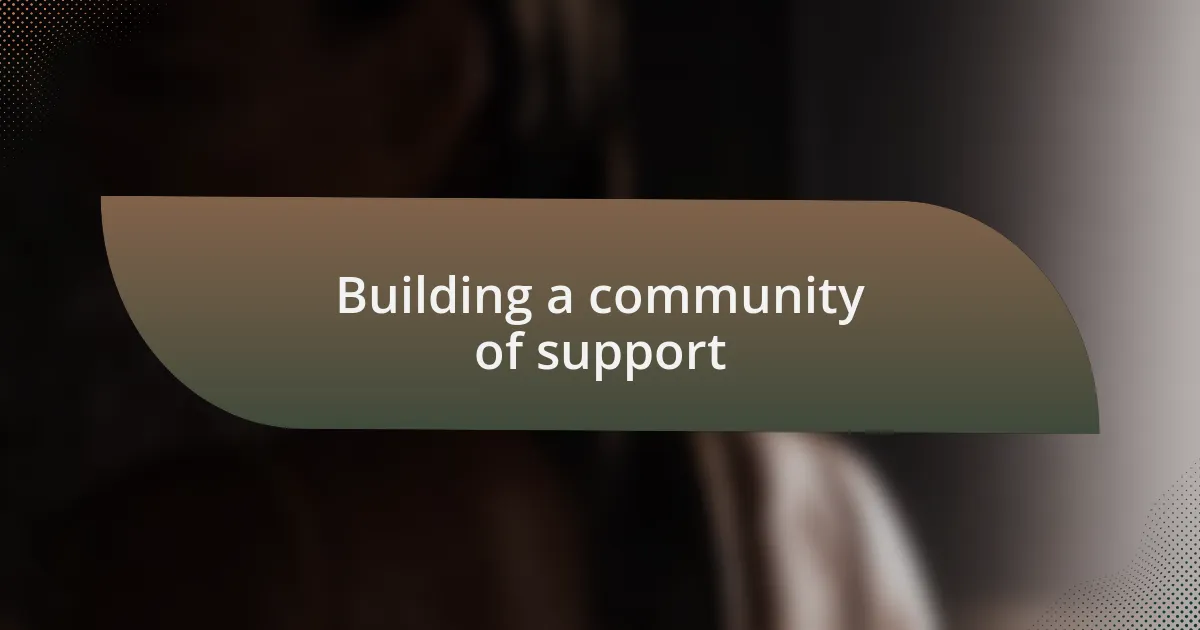
Building a community of support
Building a community of support is essential in advocacy, and I found this out during my journey. One evening, I joined a local meet-up with fellow privacy advocates. Initially, I felt a bit out of place, but as we shared our individual struggles with privacy issues, I saw how our stories intertwined. In that space, I discovered the importance of vulnerability—when we allow ourselves to be seen, we invite others to share their experiences as well.
I recall a time when a friend and I organized a small discussion group to explore privacy implications in everyday technology. What started as a casual gathering transformed into a supportive network. We exchanged resources, ideas, and, importantly, encouragement. I realized that these relationships made the daunting task of advocacy feel less isolating. How often do we underestimate the power of shared experiences in motivating change in our community?
Building a community means being present and accessible to one another. I distinctly remember responding to a newcomer who felt overwhelmed by the complexities of data privacy. I opted to mentor her, guiding her through resources while learning from her fresh perspective on these issues. That experience highlighted an essential truth: in uplifting others, we often find our own voices strengthening. Isn’t it fascinating how community support can sustain us through our advocacy journey?
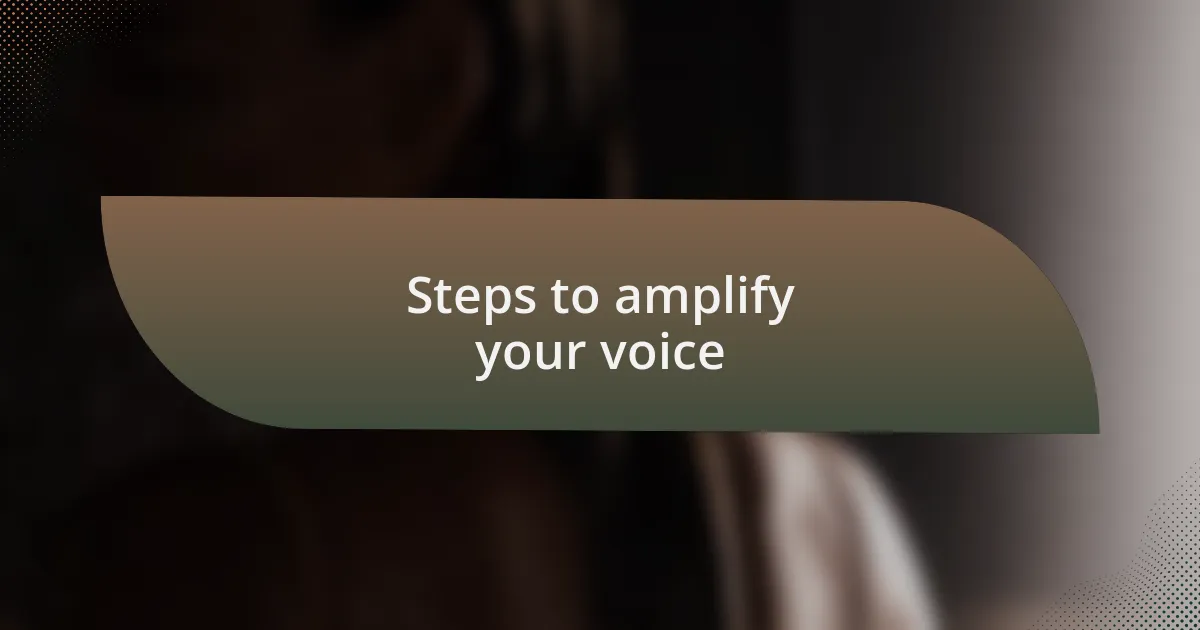
Steps to amplify your voice
Finding ways to amplify your voice starts with understanding your own message. I remember how I struggled initially to articulate what mattered to me within the realm of privacy advocacy. One afternoon, after jotting down my thoughts in a journal, I discovered clarity that hadn’t been there before. It became evident to me that writing regularly not only sharpened my viewpoint but also fueled my passion for the cause.
Engaging on social media platforms can also be a game changer. I once hesitated to share my thoughts online, fearing backlash or misunderstanding. However, when I finally shared a candid post about a personal experience with data breach, the responses were overwhelming. People reached out, expressing their own stories and support. Isn’t it amazing how vulnerability can resonate so profoundly and invite others to join the conversation?
Lastly, don’t shy away from public speaking or participating in panels. I remember my first experience as a panelist felt daunting; I was scared to fail. Yet, as I shared my insights with the audience, I realized I was not just a voice among many, but rather a catalyst for change. The adrenaline and excitement that came from sharing my journey made me more confident than I had ever anticipated. What if stepping out of our comfort zones could be the key to unlocking our true potential in advocacy? It’s worth exploring.